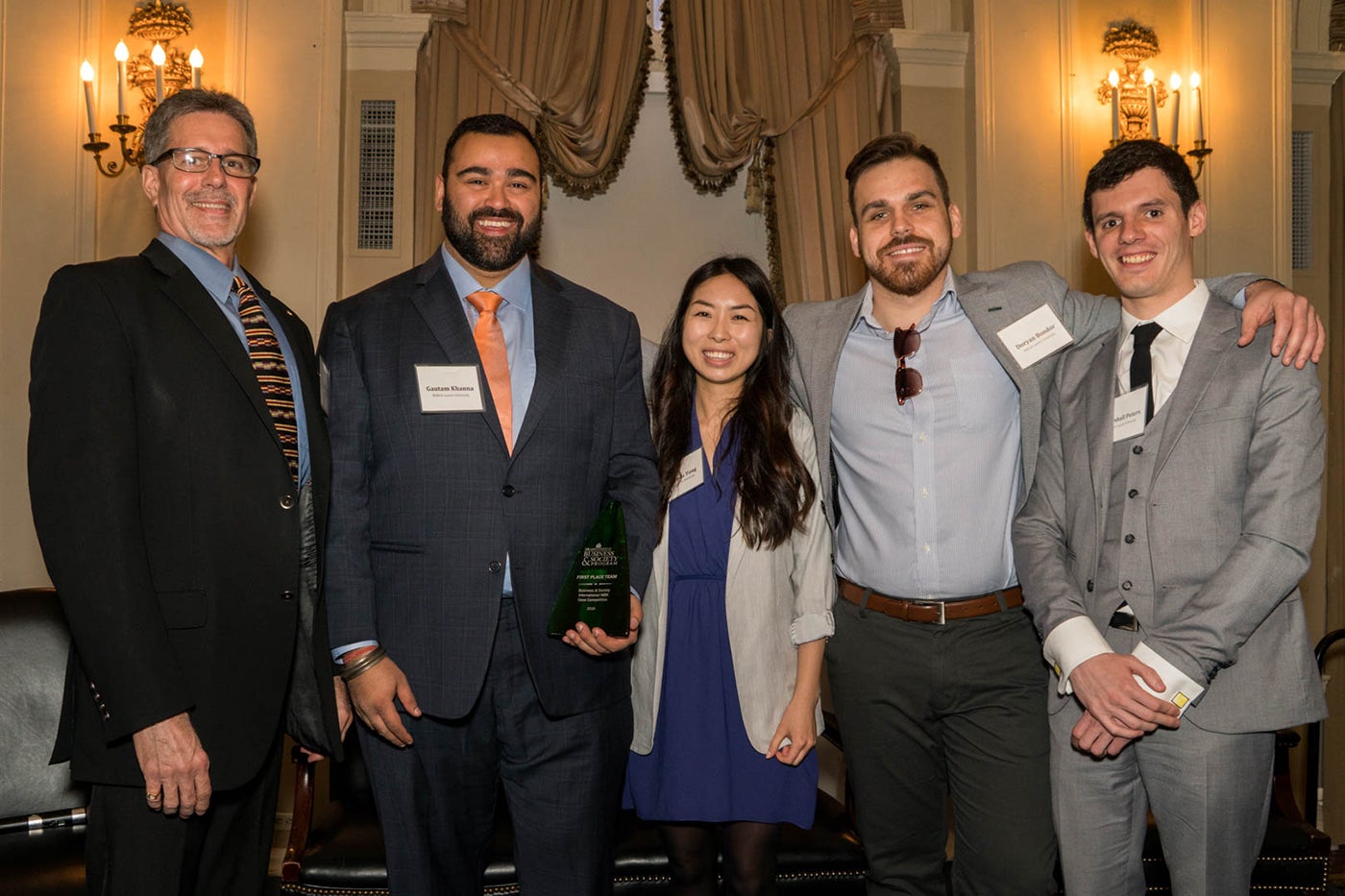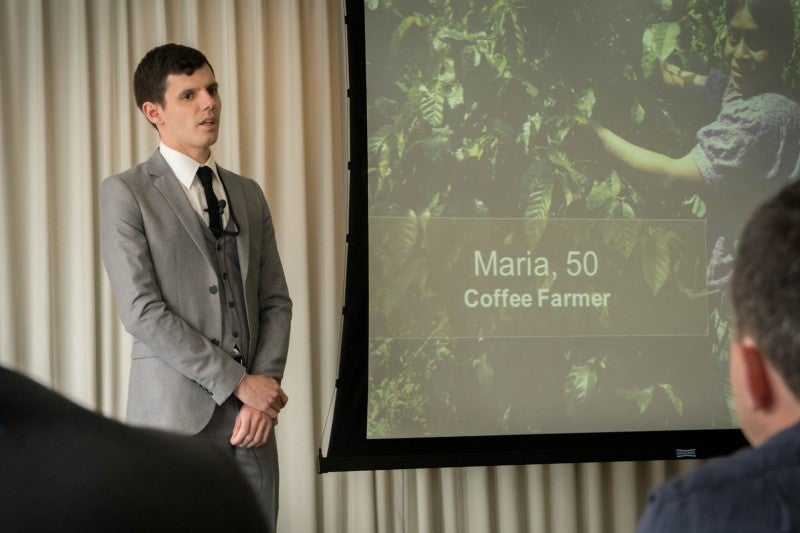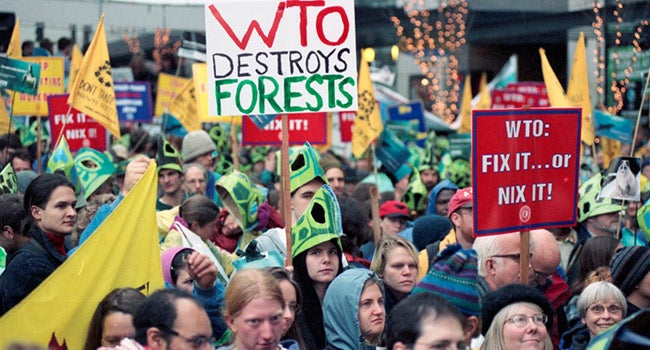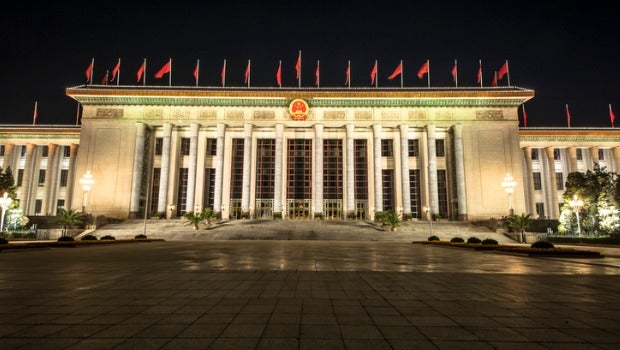
Above, the 1st place team from the Lazaridis School of Business & Economics at Wilfrid Laurier University, pictured with Mark Romano, senior vice president of education, quality, and sustainability at illy caffè North America (Photo Credit: Sean Devaney).
Now in its seventh year, the Aspen Institute Business & Society Program’s International MBA Case Competition encourages the next generation of business leaders to think innovatively about the role of business in solving the world’s most complex and pressing challenges. All finalist teams received prize money, with the first place team receiving $15,000 in scholarship funds.
Read below to learn more about this year’s case study and the winners.
“If it wasn’t for the coffee, I’d have no identifiable personality whatsoever;” so quipped former late night TV host David Letterman — and many of us can relate. But last week, over 1,000 MBA students were engaged in a different evaluation of coffee’s impact.
Coffee is grown in over 70 countries around the world and it’s estimated that over 35 million people are involved in the coffee industry — about 25 million in the cultivation process and another 10 million in other parts of the value chain.* But what percentage of the retail price of coffee actually goes back to the growers? Only 1 to 5 percent makes it into the pockets of the growers — whose livelihood, in most cases, depends solely on coffee.
Can one company transform the coffee industry to bring equity to every person across the coffee supply chain — from the grower, to the roaster, and to the barista? Andrea Illy, chairman and CEO of the global premium coffee company illycaffè, believes this grand vision is a possibility. He calls the solution a “virtuous cycle,” which he describes as a stronger relationship between coffee companies and consumers, encouraging customers to take an interest in the complexities of coffee — the bean-growing practices, the subtleties of the taste of different blends — and to view the product as an art form, instead of just a commodity.
Ultimately, illycaffè wants all coffee drinkers to feel better connected to growers, roasters and baristas, which will encourage customers to pay a little bit more for the quality that goes into their daily cup of coffee in order to fairly compensate all people (especially the farmers) involved in the supply chain.

Marshall Peters, member of the MBA team from the Lazaridis School of Business & Economics at Wilfrid Laurier University, delivers the winning case presentation (Photo Credit: Sean Devaney).
“Better Coffee, Better World” was the theme of the case study that more than 1,000 MBA students at 25 leading business schools around the world tackled in this year’s Business & Society International MBA Case Competition.
“It is my hope that students around the world who are exposed to this case study will be inspired to think big about the power of business in tackling the most critical environmental and social issues of today,” said Illy.
The competition unfolds over three rounds. In Round 1, students had just 72 hours to solve the Yale School of Management’s business case study and share their innovative ideas to improve the livelihood of growers and increase coffee connoisseurship. In Round 2, a panel of academics blindly reviewed the top case analysis from each of the participant schools and narrowed the field to five finalist teams. In Round 3, at BNY Mellon’s offices, the five finalist teams presented their case solutions live to a panel of judges, including Faith Frank, Guy Gresham and Mark Romano.
The top five MBA teams who placed in the 2016 Finals are:
- Lazaridis School of Business & Economics at Wilfrid Laurier University (1st Place, $15,000 scholarship) — read their case analysis and presentation
- Daniels College of Business at the University of Denver (2nd Place, $7,500 scholarship)
- Saïd School of Business at Oxford University (3rd Place, $5,000 scholarship)
- John Molson School of Business at Concordia University (4th Place, $2,500 scholarship)
- Villanova School of Business (5th Place, $1,000 scholarship)
The finalist teams were recognized during an event at the Yale Club of New York City. Wilfrid Laurier’s team presented their recommendations, kicking off a dynamic discussion on the role of business and higher education in social change. Panelists Xavier de Souza Briggs, Ford Foundation; Donna Rappaciolli, Fordham University; and Mark Romano, illy caffè North America, addressed how the human and environmental impacts of business activities can be brought to light to prompt business leaders — and consumers — to consider how their daily decisions cascade throughout people’s lives around the world.
The takeaways from the competition go beyond the student participants. Each year, the company featured in the case is offered valuable insights and practical ideas by the MBA Case Competition teams — which often directly influence the company’s executives and strategy.
The Business & Society Program staff believes in the significant influence — and potential for positive impact — that a well-managed, purpose-oriented business can have. And the future is looking bright! “These students are our next generation of business leaders — and I can tell you, after hearing all their final presentations — we are in good hands,” said Claire Preisser, associate director of the Aspen Institute Business & Society Program.
Visit the Business and Society Program’s International MBA Case Competition website to learn more about this annual event.
—-
* Source 1: Coffee 2016, Yale School of Management Case Study #16-013

